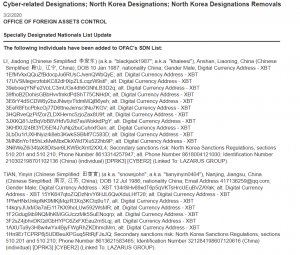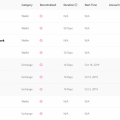The US Treasury Department's Office of Foreign Assets Control (OFAC) has charged two Chinese nationals with involvement inhacking cryptocurrency exchanges and working for North Korea. Now their bitcoin addresses are included in the sanctions list.
</p>According to US authorities, Tian Yinin and Li Jiadong are associated with the hacker group Lazarus, working in the interests of North Korea.
OFAC claims that Tien and Lee got withDPRK-controlled accounts of about $ 91 million stolen as a result of the hacking of the Bitcoin exchange in April 2018, as well as another $ 9.5 million from hacking another. To hide the source of funds, they transferred assets between addresses.
«In April 2018, an exchange employee unwittinglydownloaded malware via e-mail, which gave the attackers access to the exchange and to clients’ personal information, such as private keys. Lazarus used them to steal $250 million worth of cryptocurrencies at the time of the hack.— the department said in a statement.
What kind of exchanges in question are not specified.
Tien and Li are included in the sanction list of the Ministry of Finance, where their bitcoin addresses are added.

At the same time, OFAC removed several Russian companies from the list.
The message once again emphasizes that the DPRKmakes cyber attacks on cryptoexchanges to further finance programs to create weapons of mass destruction. According to a UN report, in this way, hackers managed to steal about $ 2 billion.
«Hackers from the DPRK are targeting cryptocurrencycommunity. They use fake cryptocurrency trading programs that contain malware. Creation of fake websites and malware to carry out phishing attacks on the cryptocurrency sector — model often used by North Korean cybercriminals», —noted in the OFAC message.
Recall, for the first time, the U.S. Treasury Department included the Bitcoin address in the sanctions list in 2018.



